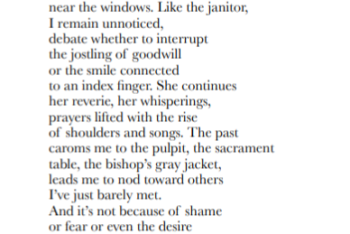Articles/Essays – Volume 47, No. 3
Denying | Leap | Someone I Used to Know
Denying
In his body’s haze and swelter,
In the furrow of appetite,
The Son of Man holds out his hand
To stem the stream of lush requests,
Inimical ramblings, templed
Invitations. He pushes back
Subtlety and evanescence,
Strains of his own sweat amid talk
Waxing of angels in their charge
Who wait for the chance to bear up.
Ripening for his ministry,
Refulgent on the mountaintop,
In hunger and need, he rejects
Illusion and its offering,
Temerity and its mayhem
Touchstones showing silver and gold
Even when they seem genuine,
Even when the road before him
Needles toward crushed olives and cross
Nests with those who will betray him.
Leap
[W]hen Elizabeth heard the salutation of Mary, the
babe leaped in her womb.
—Luke 1:41
In the timbers of a hill country voice,
I hail you across the wreath of limestone
and yard, you—God’s authentic, sparrow choice—
mettle in the tendons, pluck through the bones.
We catch the thick upwelling, blood ready
to spurt through our skin, like pinion falling
or prophecy rising, a strong eddy
in this water of custom. Such prizing
of youth and age engulfs our pregnant sphere.
No worry over haggling lunatics,
uprisings, whether we’ll go or stay here.
Softly, they’ll come, both prayers and walking sticks,
for the sacrifice of want and regret.
These arms wide open now, like fishing net.
Seeing Someone I Used to Know
She walks with others
across the chapel, her voice
trailing through the pews,
hovering like a wisp of candle light.
I take my place among the heart’s altar,
wonder about the years unfurled
between us, the grass clippings,
the hailstones, lights reaffirming
near the windows. Like the janitor,
I remain unnoticed,
debate whether to interrupt
the jostling of goodwill
or the smile connected
to an index finger. She continues
her reverie, her whisperings,
prayers lifted with the rise
of shoulders and songs. The past
caroms me to the pulpit, the sacrament
table, the bishop’s gray jacket,
leads me to nod toward others
I’ve just barely met.
And it’s not because of shame
or fear or even the desire
to stay unseen that prevents me
from seeing how her life
has come to pass. And it’s not
because I’m unfeeling or disinterested
in my friend’s good keeping.
It’s a matter of control
and letting go,
letting the past surprise me
without commentary and justification
as I take and eat the bread,
knowing, regardless of the hour
or season of worship,
the past will arrive quietly
in an unchosen hour
warming, perhaps bowing,
like a candle flickering
at what once was
and who we used to be.


 Back to full Issue
Back to full Issue

